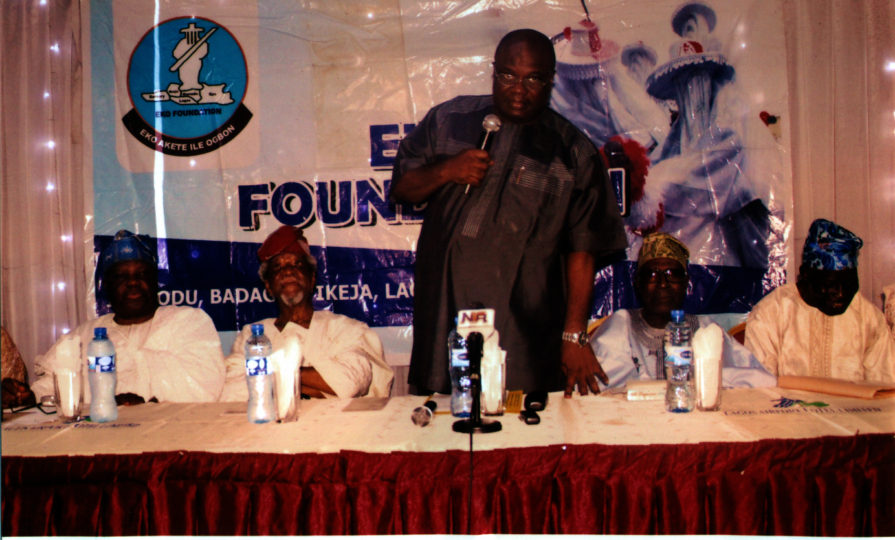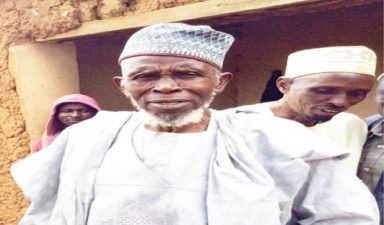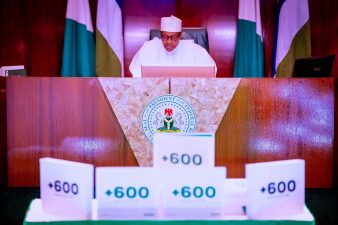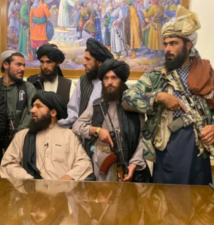*Gen Olanrewaju, Femi Okunnu, Anibaba, Kunle Alli, Gen Martins, Smith say time Lagos indigenes partake in state affairs
The mood of Eko, officially called Lagos, took a new shape on Friday as prominent sons and daughters of the Centre of Excellence converged on the Lagos Airport Hotel to celebrate the 50 years anniversary of the creation of Lagos but, at the same time, used the occasion to drive home their strong demand that the days when indigenes of Lagos were pushed behind the doors by “strangers” in state affairs were gone.
They all agreed that Lagos has the attitude of accommodating strangers to the extent of encouraging them to be great achievers in their chosen trades and professions. They however came bold to say that what they would no longer take was a situation where the indigenes would now be marginalized in the affairs of the state, whose creation was agitated for mostly by Lagos indigenes and for Lagos indigenes alone.
The charges were made at a symposium organized by Eko Foundation with former Minister of Communications, Major General Tajudeen Olanrewaju, as Chairman of occasion. Others in attendance included the President, Eko Foundation, Prof. Imran Oluwole Smith, former Federal Commissioner for Works, Alhaji Femi Okunnu (SAN), former Commander, Nigerian Army Ordnance Corps, Major General Adekunle Martins (Rtd) representing the Chairman of occasion, Major General Tajudeen Olanrewaju (Rtd), Chief Musiliu Olaiya Anibaba and Hon. Adekunle Alli, former Military Governor of old Ondo State, Chief Olabode George, Dr. Ade Dosunmu, Mr. Tola Animashaun, Dr. Mufutau Olanrewaju and other prominent Lagos indigenes.
In his address as chairman of the occasion, General Olanrewaju, who noted that fifty years in the lives of the people as indigenes of the most liberal and accommodating state was worth celebrating, made straight to say that it was time indigenes began to know and be part of the day-to-day administration of their own affairs.
The former General Officer Commanding, Third Armourd Division of Nigerian Army said, “At this point in time, we must begin to look inwards and examine where Lagos State is being steered into and what opportunities exist for its indigenous communities. I am not therefore surprised that the Eko Foundation has shown capacity to defend the interest of the citizens no matter whose ox is gored.
“It is imperative to understand the fact that no other issue has shaped the history and destiny of the state so much as the fight to secure and control the State by outsiders from within. Tell me any State that is not controlled by its own indigenous folks. Lagos State syndrome is as real as it is in other States of the Federal Republic.”
Represented by Major General Abdullahi Adekunle Martins (Rtd), General Tajudeen Olanrewaju ventilated his worry about the common say of “Lagos is no man’s land” challenging all Nigerians to tell him one state in the country that is not controlled by its own indigenous folks.
He said he was “terribly disturbed to be told that Lagos is no man’s land” and that he was further disturbed about the impact that “such an extraordinary arrogant and insulting boast has had on our communities.”
He then went down the memory lane saying, “Lagos had been a colony and run as a protectorate until its cession to the British Administration in 1861 by King Dosunmu of Lagos. Epe, Ikorodu, Badagry, Ikeja, Agege etc had been governed by separate Administrations although controlled by the indigenous elements of those areas. I am proud to be a descendant of the Dosunmu Dynasty of whose progenitor was daughter of the king named APOTUN,and, proud also of my Awori extraction of KUYASE AWUSE Iluobi Dynasty of Onigbogbokingdom, hence the inherited ethnic bigotry label of NO MAN’’S LAND status of Lagos must be repudiated with a resounding force of reason by all of us.”
He went on, “The sudden turn about negating those indigenous interests has been quite devastating. And if an organization like Eko Foundation among other similar organizations in Lagos State feel that their voices have to be heard in the shaping of the public policy of the government of the State, it is a right cause to be fully supported by all and sundry.
“Lagos State indigenes must keep its destiny in their hands; shape it to suit their circumstances like other States are doing. I think our detractors must not oversimplify our genuine complaints by leading us, such as (awon won niomoeko) in derision of our genuine claim. Should we feel insecure about ourselves, our children and our children’s children by keeping quiet and allowing our fate to be decided by those residents within and without, who have no cultural root amongst us?” Olanrewaju asked in his address read by General Martins.
Major General Tajudeen Olanrewaju, a Lagos State Prince, charged that, “The state being a tolerant state should start to emancipate and empower its indigenes much in the same manner as other states are doing for their indigenous folks. All the classes of the indigenous communities must be taken on board.
“The important point therefore is that liberalism in the state will continue to have an impact on our political behavior. But be that as it may, this must be balanced on equity, equality, local interest and, above all the rights of the indigenous communities not only in Lagos division but also in other divisions of Epe, Badagry, Ikorodu, Ikeja etc. The Lagos State indigenes and their communities will do everything possible to prevent being labeled the ‘RED INDIANS of the state’,” he said.
In his own submission, former Federal Commissioner for Works, Alhaji Femi Okunnu (SAN) wondered what people clamouring for restructuring of Nigeria meant by the demand. He however said, “My own emphasis is that, whatever restructuring that must be, Lagos State must remain as a unit” because, according to him, Lagos as a Colony had existed since 1861 adding that not even the 1st January 1904 policy, which made the Protectorate of Northern Nigeria and the Protectorate of Southern Nigeria begin to cooperate as British possessions, changed the status of Lagos.
Okunnu, in trying to establish what he called the historical facts about why Lagos is distinct and must be treated as one, said, “By 1914, there was technical, not political, merger of the Protectorate of Northern Nigeria, Lagos Colony and Protectorate of Southern Nigeria. I will like to remind you that Lagos administration remained intact until 1950 in the advent of the McPherson Constitution. I will also like to remind you that Lagos administration as a separate administrative unit was headed at that time by Mr. E. A. Carr as Commissioner for the (Lagos) Colony established in 1861. And it was J. C. Allen that was the Deputy Commissioner for the Colony as a distinct administrative unit.
“At that time Nigeria was governed under Richard’s Constitution, which had Lagos Colony as a unit, Protectorate of Northern Nigeria as a unit and Protectorate of Southern Nigeria as a unit making three units. Richard’s Constitution in 1946 split Southern Protectorate in two: Western Region and Eastern Region. Northern Protectorate became Northern Region. So, at that time, the four political units making up Nigeria were Northern Region, Western Region, Eastern Region and the Colony of Lagos with the Lagos consisting of the City of Lagos, at that time it was a town until 1952, Epe Division, Badagry Division and Ikeja Division. There was no Ikorodu Division at that time. Ikorodu was part of the Ikeja Division and was carved out as a Division during the administration Mobolaji Johnson.
“That is the historical fact. I am trying to establish the distinctiveness of Lagos as an administrative unit, which started in 1861. So, while the regions had their governors for Northern Region, Western Region and Eastern Region, Lagos had its Commissioner for the Colony as the head of administration.
“Then in 1950 under the McPherson Constitution, for the first time in history, Lagos Colony was merged with Western Region. And that was where our uncles and brothers started the agitations (with the slogan) Gedegbe l’Eko wa meaning that Eko, that is Lagos had been distinctive administrative unit since 1861 under British occupation. That was when the agitations started. The people that agitated for the founding of this state of Lagos were the Lagos Movement in the early 1950s. The late Mr. H. N. Alli Balogun, the late Kasali Aremu Kotun, the first child of Ajiroba Karimu Kotun, the late Black Prince, Prince Adejumo Akintoye, the second son of late Oba Ibikunle Akintoye (1925 – 1928), who was a torn in the flesh of the British administration in Lagos at that time and so was exiled to Oyo. Those were the founders of Lagos State Movement in the early 50s.
“Under the 1954 Constitution with James Roberson as Governor-General of Nigeria, Lagos City was extracted from the Western Region to become the Federal Territory. But the remainder of the Colony: Epe, Badagry, Ikeja which were Colony provinces in the then Western Region remained in the Western Region but Lagos City, which included Apapa, Ikoyi and parts of Island and the Mainland alone, was extracted as Federal Territory.
“We must give honour to Yakubu Gowon because without him, there would not have been Lagos State. He was advised by a group of civil servants who were fighting for the creation from outside the service. One of them is Allison Aida, the other one is Chiedu Philip Asiodu, there were some others. This is just to tell you a little about how Lagos State came into being.
Speaking to The DEFENDER after the event, Major General Adekunle Martins (Rtd) said the idea of people coming from outside Lagos to take appointments depriving the indigenes only to take the benefits back to their own respective states at the detriment of Lagos State indigenes must cease to be.
“The challenge of the situation is the future of our children and our great grandchildren, which, if people play us out of relevance now just because of their hooks, where do they want us to go. Somebody will come to Lagos from anywhere he is coming from, he will do one or two things, maneuver and put himself in position to decide who comes to the Lagos State Government to work. Who benefits? Meanwhile you as a Lagos State person doesn’t have any right. Some of them come here they take appointment and leave Lagos to contest in their respective places therefore benefitting from two of more places. Meanwhile Lagos State indigenes have no such opportunity. All opportunities are being denied.
“Eko Foundation is not saying don’t give opportunity to people. What it is saying is, give opportunity to indigenes, those that supposed to benefit by rights. Can I go to Zamfara now and say I want to contest as Martins? Can I go to Anambra to contest? I cannot even go to Ogun State to contest coming as Lagos indigene. We can’t go to other places. But if they come here, they look for things and take charge of your resources and then, you are just completely marginalized as if you are not a relevant person. And yet they start making useless comment to say Eko is no man’s land. What does that imply?
“People are from Maforija, Epe, Ikeja, Egun, Awori. So many different tribes are Lagosians yet they don’t have opportunities, they are not adequately represented at both Federal and State levels, they are not given so much of opportunity, they are not empowered. And those appointed from Lagos to the Federal, when they finish Lagos State service, they go to their states and still claim the same.
“I think the people that are concerned particularly the Eko Foundation should not only think about today but more importantly they should think about the relevance of Lagos indigenes in tomorrow politics, education, everything because where it stands now, we are completely marginalized,” he said.
Reading from a letter of October 1956 written by Oba Adeniji-Adele to the British Government in his personal agitation for creation of Lagos State, the Mayegun of Lagos, Hon. Adekunle, revered for being a major custodian of Lagos historical facts, said “Lagos is not a Yoruba Land. We are not saying that non-indigenes should not benefit but we are also saying that we the indigenes of Lagos must be given opportunities to be part of the administration of state.”
According to the Oba Adeniji-Adele’s letter, Hon. Alli read, “…some people say Lagos or Eko is part of Yoruba Land, which is not true.”




